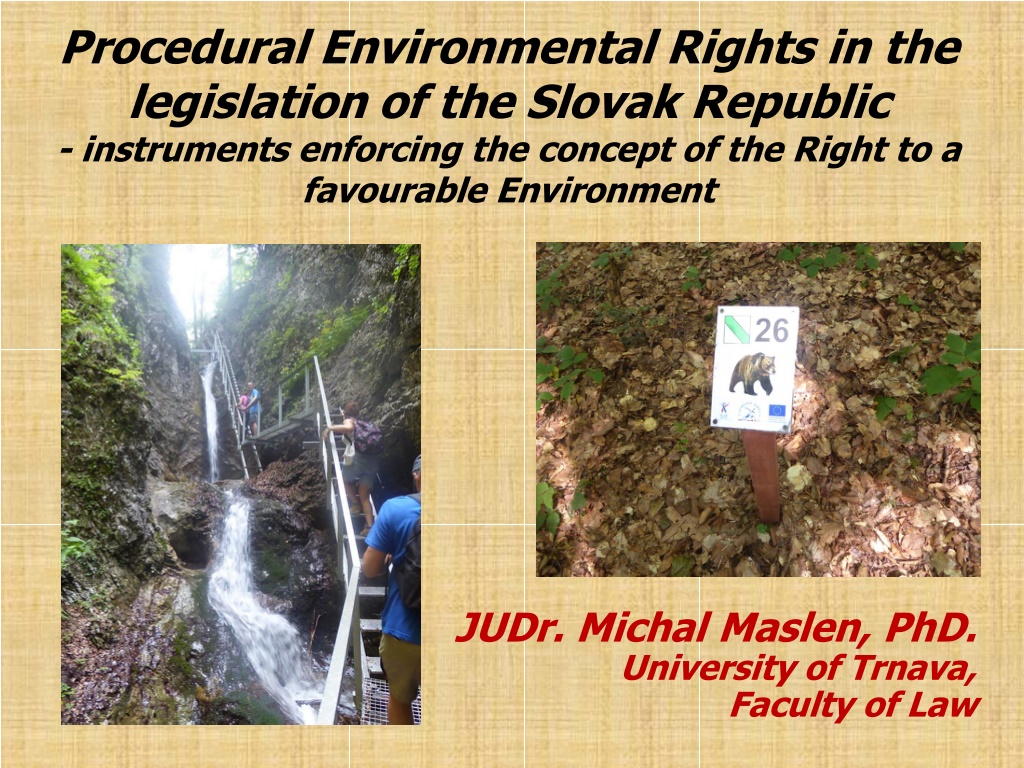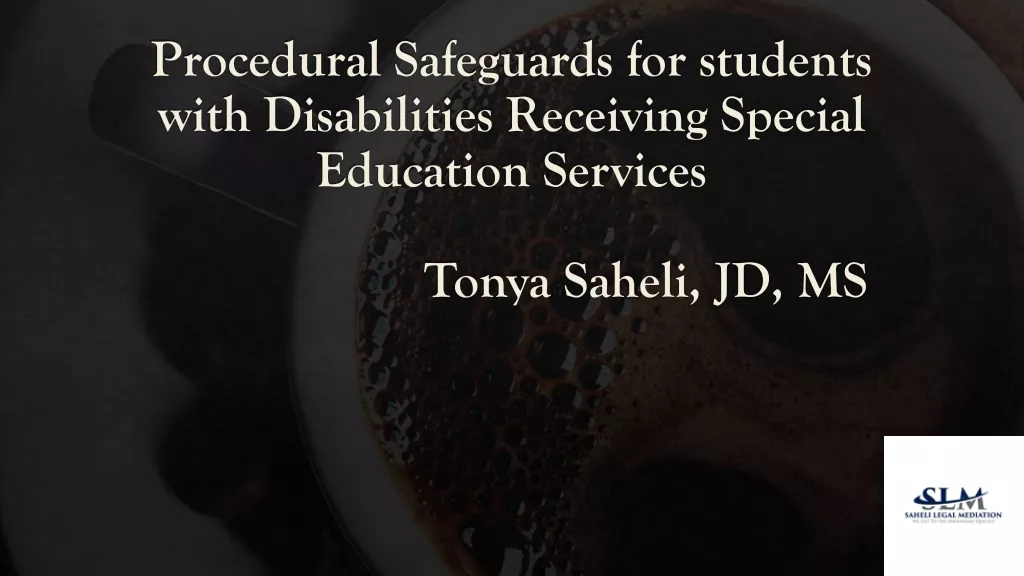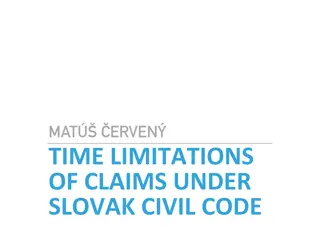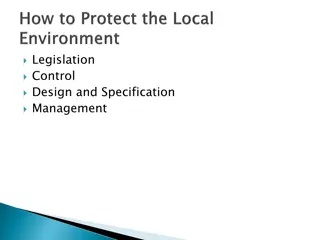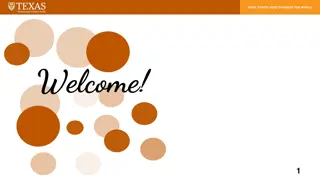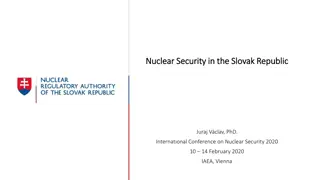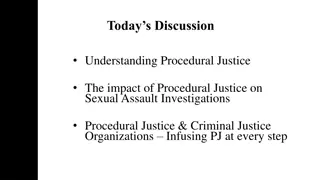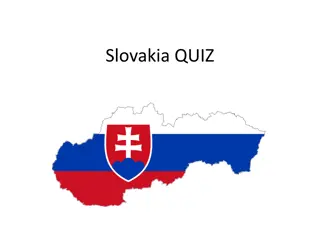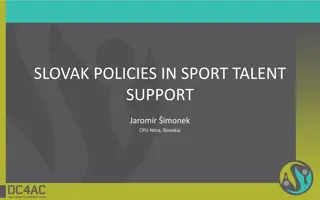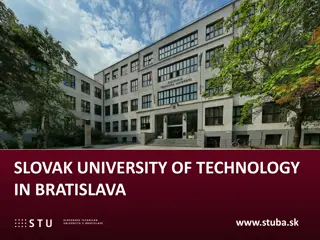Procedural Environmental Rights in Slovak Legislation
This content explores the instruments enforcing the concept of the Right to a favorable environment in the legislation of the Slovak Republic, focusing on laws such as the Right to Information, Public Participation, and Judicial Protection. It delves into constitutional provisions guaranteeing freedom of speech, right to information, public affairs participation, and establishing conditions for citizen engagement in decision-making processes.
Download Presentation

Please find below an Image/Link to download the presentation.
The content on the website is provided AS IS for your information and personal use only. It may not be sold, licensed, or shared on other websites without obtaining consent from the author.If you encounter any issues during the download, it is possible that the publisher has removed the file from their server.
You are allowed to download the files provided on this website for personal or commercial use, subject to the condition that they are used lawfully. All files are the property of their respective owners.
The content on the website is provided AS IS for your information and personal use only. It may not be sold, licensed, or shared on other websites without obtaining consent from the author.
E N D
Presentation Transcript
Procedural Environmental Rights in the legislation of the Slovak Republic - instruments enforcing the concept of the Right to a favourable Environment JUDr. Michal Maslen, PhD. University of Trnava, Faculty of Law
Connection with procedural environmental rights Art. 26 of the Constitution of the Slovak Republic. Right to information Art. 30 of the Constitution of the Slovak Republic. Right of public participation Art. 44 of the Constitution of the Slovak Republic. Right to a favorable environment Art. 46 of the Constitution of the Slovak Republic. Right to judicial and other protection Art. 51 (1) of the Constitution of the Slovak Republic. Legal restriction of some rights (favorable environment, info about the environment, judicial protection)
Art. 26 of the Constitution of the Slovak Republic. one of the fundamental political rights (1) The freedom of speech and the right to information are guaranteed. (3) Censorship is banned. (4) Restriction - ... if such a measure is necessary in a democratic society to protect the rights and freedoms of others, state security, public order, or public health and morals. (5) Public authority bodies are obliged to provide information on their activities in an appropriate manner and in the state language. The conditions and manner of execution shall be laid down by law.
Art. 30 of the Constitution of the Slovak Republic. one of the fundamental political rights guarantees the right to participate in public affairs directly (to vote on matters of public interest in a national referendum and local referendum) indirectly (to vote on the election of representatives to the National Council of the Slovak Republic, to the European Parliament, the organs of local self-government). It only belongs to the individuals, who exercise the right to participate in public affairs and legitimize public authority.
the administration shall establishes conditions for all citizens to participate in the public affairs and decide on public matters on the basis of direct and concrete expression of will of all citizens, or particular groups of citizens
whether it only guarantees direct participation in the exercise of state power through referendums at various stages, or whether this term also includes other forms of participation in public affairs, in a broader sense, for example, in the form of commenting the drafts laws of general application. The case law seems to be generally accepting the opinion said first. However the second conclusion is rarely and cautiously admitted too. Under the article 2 (1) of the Constitution State power originates from citizens, who exercise it through their elected representatives, or directly .
Art. 44 of the Constitution Everyone has the right to a favorable environment. Everyone has the right to timely and complete information about the state of the environment and natural resources. No one may, in exercising her rights, endanger or cause damage to the environment, natural resources, the wealth of natural species, or cultural monuments beyond the extent set by a law.
The Constitutional court of the Slovak Republic Deciding for 23 years now (40 cases related to environmental rights) Cautious and not willing to interpret this right Orientated on the procedural conditions of the decision making Often not responding to the arguments Missing the proactive approach to this right Only one opinion from 2003 on the environmental protection as a public interest in the state ruled by law Czech opinion: impotent right (similar legislation)
ARTICLE 46 OF THE CONSTITUTION (1) Everyone may claim his right in a manner laid down by law in an independent and impartial court and, in cases laid down by law, at another body of the Slovak Republic. (2) Anyone who claims to have been deprived of his rights by a decision of a public administration body may turn to the court to have the lawfulness of such decision reviewed, unless laid down otherwise by law. The reviewed of decisions concerning basic rights and freedoms must not, however, be excluded from the competence of the courts. ... (4) Conditions and details concerning judicial and other legal protection shall be laid down by law.
Quite a strong position in the case-law of the Constitutional court Slovak court Willing to interpret this right However still not in the environmental context
Constitution guarantees the right to a favorable environment as a fundamental right. still not to legal entities, possible legal limits right to a favorable environment the form of principle and constitutionally protected value in the objective sense constitutionally declared objective or Article 51 (1) of the Constitution (1) The rights listed under ... Articles 44 to 46 of this Constitution can be claimed only within the limits of the laws that execute those provisions.
Aarhus Convention : CONVENTION ON ACCESS TO INFORMATION, PUBLIC PARTICIPATION IN DECISION-MAKING AND ACCESS TO JUSTICE IN ENVIRONMENTAL MATTERS EU is also a member as an entity of international law ensure compliance with international treaty throughout the whole territory of the Union also applies to those Member States which have not transposed the international treaty the clauses of the
The fact that the international treaty is a part of the European law does not automatically mean that it has a direct effect in relation to the national regulations of the Member State although, on the basis of the case-law of the Court of Justice of the European Union it may have; the condition with regards to its wording, subject and nature, contains a clear and precise right or obligation that is unconditional, i.e. it does not require the adoption of a further instrument for its implementation.
has by June 2009 submitted 120 judicial actions demanding the reversal of the negative decisions in the matter of return of its right of access to the courts. the association requested administrative proceedings granting an exception to the systems of protection for brown bear the Supreme Court of the Slovak Republic has already confirmed 50 of such negative decisions. But because of the ongoing position of the civic association the Supreme Court of the Slovak proceedings and to submit to the Court of Justice under the Article 234 EC for a preliminary ruling the preliminary questions connected with the interpretation of the Aarhus Convention. to be party to the Republic decided to stay
The effects of the obligations contained in the Art. 9 of the Aarhus Convention especially the right of the civic association to challenge such a decision before the court and object its unlawfulness Under the Art. 9 (1) of the Aarhus Convention: Each Party shall ... ensure that any person who considers that his or her request for information ... has been ignored ... has access to a review procedure before a court of law ...
Whether, in the field covered by the Aarhus Convention the EU has exercised its powers and adopted provisions to implement the obligations which derive from it. If that were not obligations deriving Convention would covered by the national law the from continue case, the Aarhus to be
EU has exercised its powers and adopted provisions in the field covered by the Aarhus Convention, the European law would apply the Court of Justice to determined EU has explicit external competence under the Art. 175 EC
principle of equivalence principle of effectiveness Brown bear - species protected by EU law it is for the national court - to ensure effective judicial protection in the fields covered by EU environmental law, to interpret its national law in a way which, to the fullest extent possible, is consistent with the objectives laid down in the Art. 9 (3) of the Aarhus Convention even in a situation where this article does not have direct effect in the law of the European Union.
The Aarhuss Convention shall be used as an interpretation tool However even after the decision of the ECJ in 2011 Problems of the NGOs to submit successfully complaints connected with the right to a favorable environment to the Constitutional court of the SR Doctrine Right to a favourable environment belongs only to natural persons
Approach of the Concstitutional court of the SR Unsustainable Aarhuss Convention as an interpretation tool may affect also the content of other constitutionally guaranteed rights Right to judicial protection, right to public participation Legislation in the SR slowly declares the environmental procedural rights to the public concerned E. g. the Art. 24 (2) of new EIA act the public concerned has the right to a favorable environment E. g. the Art. 42 of the Administrative Judicial Code if the public concerned has a special right under the special legislation it has also the right t a judicial protection
Legislation - slow creation of connection Between the right to a favorable environment and the right to judicial protection and the right to public participation The negative approach of the Constitutional court of the SR towards NGOs as legal entities Unsustainable Respond inevitable, shall come soon !!!
Stuica primeval beech forest National park Poloniny
